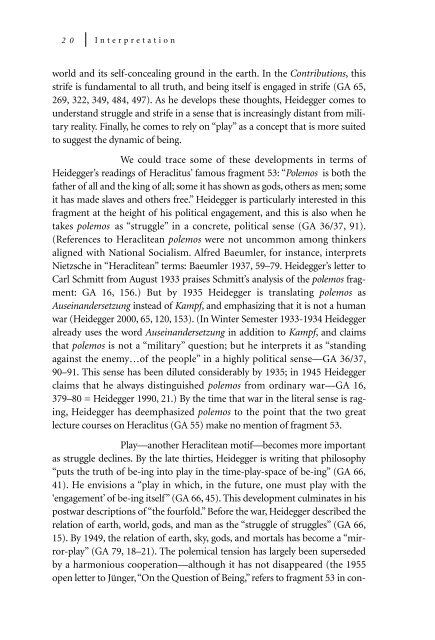Beyond Struggle and Power: Heidegger's Secret ... - Interpretation
Beyond Struggle and Power: Heidegger's Secret ... - Interpretation
Beyond Struggle and Power: Heidegger's Secret ... - Interpretation
Create successful ePaper yourself
Turn your PDF publications into a flip-book with our unique Google optimized e-Paper software.
2 0 <strong>Interpretation</strong><br />
world <strong>and</strong> its self-concealing ground in the earth. In the Contributions, this<br />
strife is fundamental to all truth, <strong>and</strong> being itself is engaged in strife (GA 65,<br />
269, 322, 349, 484, 497). As he develops these thoughts, Heidegger comes to<br />
underst<strong>and</strong> struggle <strong>and</strong> strife in a sense that is increasingly distant from military<br />
reality. Finally, he comes to rely on “play” as a concept that is more suited<br />
to suggest the dynamic of being.<br />
We could trace some of these developments in terms of<br />
Heidegger’s readings of Heraclitus’ famous fragment 53: “Polemos is both the<br />
father of all <strong>and</strong> the king of all; some it has shown as gods, others as men; some<br />
it has made slaves <strong>and</strong> others free.” Heidegger is particularly interested in this<br />
fragment at the height of his political engagement, <strong>and</strong> this is also when he<br />
takes polemos as “struggle” in a concrete, political sense (GA 36/37, 91).<br />
(References to Heraclitean polemos were not uncommon among thinkers<br />
aligned with National Socialism. Alfred Baeumler, for instance, interprets<br />
Nietzsche in “Heraclitean” terms: Baeumler 1937, 59–79. Heidegger’s letter to<br />
Carl Schmitt from August 1933 praises Schmitt’s analysis of the polemos fragment:<br />
GA 16, 156.) But by 1935 Heidegger is translating polemos as<br />
Ausein<strong>and</strong>ersetzung instead of Kampf, <strong>and</strong> emphasizing that it is not a human<br />
war (Heidegger 2000, 65, 120, 153). (In Winter Semester 1933-1934 Heidegger<br />
already uses the word Ausein<strong>and</strong>ersetzung in addition to Kampf, <strong>and</strong> claims<br />
that polemos is not a “military” question; but he interprets it as “st<strong>and</strong>ing<br />
against the enemy…of the people” in a highly political sense—GA 36/37,<br />
90–91. This sense has been diluted considerably by 1935; in 1945 Heidegger<br />
claims that he always distinguished polemos from ordinary war—GA 16,<br />
379–80 = Heidegger 1990, 21.) By the time that war in the literal sense is raging,<br />
Heidegger has deemphasized polemos to the point that the two great<br />
lecture courses on Heraclitus (GA 55) make no mention of fragment 53.<br />
Play—another Heraclitean motif—becomes more important<br />
as struggle declines. By the late thirties, Heidegger is writing that philosophy<br />
“puts the truth of be-ing into play in the time-play-space of be-ing” (GA 66,<br />
41). He envisions a “play in which, in the future, one must play with the<br />
‘engagement’ of be-ing itself” (GA 66, 45). This development culminates in his<br />
postwar descriptions of “the fourfold.” Before the war, Heidegger described the<br />
relation of earth, world, gods, <strong>and</strong> man as the “struggle of struggles” (GA 66,<br />
15). By 1949, the relation of earth, sky, gods, <strong>and</strong> mortals has become a “mirror-play”<br />
(GA 79, 18–21). The polemical tension has largely been superseded<br />
by a harmonious cooperation—although it has not disappeared (the 1955<br />
open letter to Jünger,“On the Question of Being,” refers to fragment 53 in con-
















